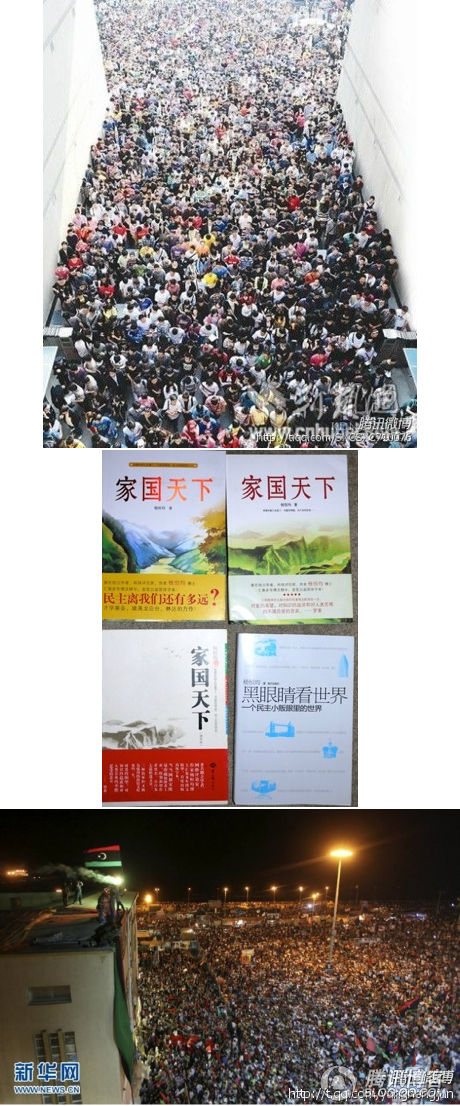Is this for real, or fake? The struggle has gone on for half a year, and just when people are about to lose all interest, Gadhafi falls from power? Fortunately, as soon as I went online to catch up on the news I found a statement from China’s Ministry of Foreign Affairs: “The other day the Libyan opposition forces pushed into the capital city of Tripoli . . . On this matter, China’s Ministry of Foreign Affairs has said: China respects the choice of the Libyan people, and hopes that the situation in Libya is returned to stability as quickly as possible, and that the Libyan people can live normal lives . . . “
Back at the time when the United Nations voted on the Libyan situation, Old Yang was really concerned that the Ministry of Foreign affairs would go and cast a no vote, besmearing the faces of all Chinese. The fall of the Gadhafi regime was just a matter of time, and anyone with a basic sense of history and common sense is clear about that. Fortunately, this time the Ministry of Foreign Affairs did the right thing.
So we still don’t know what deep hole Gadhafi is hiding in, and our [foreign ministry] gets a jump-start on respecting “the choice of the people.” But having repeated that phrase, it leaves me a tad uncomfortable. What does it mean to “return to stability” and “live a normal life”? Was the Gadhafi era what one might call stable? Was that normal life? If that was normal life, then we can say that pretty much the whole world lives in an abnormal state. And what’s more, when are we going to respect the choice of the Chinese people?
Talking about the whereabouts of Gadhafi recalls the time when Saddam Hussein was found hiding away in a hole, and some people wondered why he would subject himself to such humiliation. What had happened to all of those lofty sentiments about leading the country in opposing America and the West? Was he not willing to sacrifice himself for his righteous cause? How is it these tyrants are all the same? And in talking about Iraq, we can’t help but remember the words we’ve seen on so many websites in China lately: “We’re concerned that Libya might become another Iraq . . . “
“Another Iraq”? This definitely means seeing Iraq as a negative example. After the American invasion of Iraq there certainly was a time of chaos and killing, but was that not because the dictator Saddam was unwilling to give up his absolute rule and continued to put up a resistance? Try asking the Iraqi people: How many of you are unwilling to make these sacrifices and would rather return to the era of Saddam Hussein? Was there less mass murder and chaos in Iraq under Saddam than there is now?
Iraq today is certainly not a negative example. Just look at the way major television news networks no longer have news to broadcast about mass killings and you know. Particularly in comparison to the era of Saddam Hussein, Iraq is heading towards brighter times.
When we hear international media reporting again and again on continued chaos and violence in Iraq, however, and when see Iraqis saying on the television that times aren’t as good as they once were, this in fact shows us the biggest difference between Iraq in the time of Saddam and Iraq today. In the Saddam era, did we ever see Iraqis looking into the lens of international media and daring to express their dissatisfaction with political leaders? Those who see Iraq as a textbook of bad examples should look at North Korea, which the American military never has managed to topple. Are the people there harmonious? Are there no killings? Is there no chaos?
America is the world’s preeminent political, economic and military power, and it is also the base camp for so-called freedom and democracy. These actions to overthrow political despots can’t happen without America’s participation. But from the Federal Republic of Yugoslavia to Iraq to Egypt to Libya, there have been many differences. In the overthrow of Saddam Hussein, the United States seemed to pull up its sleeves and cast aside all pretense, giving the impression that it wanted to push democracy into all corners of the world where tyranny reigned. After Iraq, though, it stopped its advance.
Still, history would not slow its steps even as America rested. Egypt and Libya are both old friends of the United States, and revolutions have now happened there. What does this tell us? Everyone take note: the concepts of freedom and democracy are not monopolized by the United States, and without the support of America, or quite the opposite, even as America is supporting despots like Mubarak, the people will eventually rise up and throw them down.
I would also say to calm those who think that the violence and chaos that followed the American occupation of Iraq will be replayed in Libya: these kinds of things could not happen in Egypt and Libya. The reason is very simple. The Libyan opposition party that has seized power in Libya is not the American military, and those followers of Gadhafi who dared to terrorize their own citizens will definitely face bloody retribution and be completely routed.
It may seem a bit politically incorrect for me to say that, but that’s the way it is. Six years ago, an American military officer recently returned from Iraq told me that all the United States had to do was pull out of Iraq and within three months there would be no terrorist attacks in Iraq. Why? Because Iraqi leaders felt that the American military was too meek, and they would employ the most extreme means of burying the old remnants of Saddam’s units, eliminating all terrorist activities. [Portions following were not translated, but we recommend them for readers of Chinese.]
In writing on this topic my heart feels heavy and conflicted. On the one hand, I feel some unwarranted anxiety, that if all of the tyrants pass on the world might somehow be a less interesting place. What use would there be for a “democracy huckster” like me? On the other hand, I really hope we can bid farewell on this earth to all tyrants, and all forms of undemocratic rule, never to see them again.
Everyone should have confidence — confidence in themselves, in their friends and acquaintances, confidence in the people. Believe me, no one is born hoping to be a slave, or spurning freedom and autonomy. Each person wants to be their own master. You don’t believe me? After this post I’m pasting two different news photos, both showing how people want to be their own masters. One is from Libya and the other is from China. Both photos show how the people of these two countries hope to “be the masters of their own country.” Just so everyone can see clearly, I’ve placed several of my recently published books between them (just a bit of casual advertising).

[ABOVE: At top, the people of Wuhan, China, with the hope of being masters by jamming their way into the absolute power [of the Chinese Communist Party], crowd together hoping to take the public service examination for official government posts. In the middle, Old Yang’s books. At the bottom, the people of Libya become their own masters, overturning absolute power and crowding into a public square.]
This is a translated and edited version of a post made by Yang Hengjun to his online blog on August 24.
[Frontpage Photo by “BRK Network” available at Flickr.com under Creative Commons license.]




















